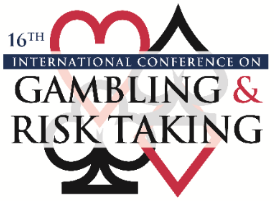Session Title
Session 1-2-E: A Look Inside the Gambling Mind
Presentation Type
Event
Location
The Mirage Hotel & Casino, Las Vegas, Nevada
Start Date
7-6-2016 10:30 AM
End Date
7-6-2016 12:00 PM
Disciplines
Cognitive Psychology | Mental and Social Health | Psychology | Substance Abuse and Addiction
Abstract
A contemporary stance on regular and problematic electronic gaming machine (EGM) gamblers argues that these individuals use machine gambling as a means of escaping aversive feelings rather than as a means of seeking out excitement. Often called “The Slot Machine Zone,” this hypothesis currently rests on qualitative and anecdotal data suggesting that machine gamblers are somehow lost in the game (Schüll, 2012). Conceptually similar to work on flow and dissociation, the zone hypothesis predicts that problematic EGM play is associated with 1) increased self-reported dissociation / immersion, 2) attenuated peripheral attention, and 3) a positive physiological state as a result.
We investigated these claims in the Hybrid Casino Laboratory at the University of British Columbia. Two samples of university undergraduates and a community sample of regular EGM gamblers played a genuine slot machine for 30 minutes while monitoring the peripheral visual field for attentional targets. Heart rate and skin conductance data were collected, with particular interest in using heart rate variability as a marker of parasympathetic (vagal) withdrawal. Participants reliably showed a vagal withdrawal effect during gameplay, indicating physiological engagement with the game. Scores on the Problem Gambling Severity Index positively predicted both self-reported dissociation-like states and reduced responding to peripheral visual targets. These results evaluate behavioural indices of EGM immersion and suggest novel strategies for identifying problematic EGM use.
Keywords
Gambling, Flow, Dissociation, EGM, Slot Machine, Attention, Behavior, Zone, Psychology
The Cost of Getting Lost: Measuring the Slot Machine ‘Zone’ with Attentional Dual Tasks
The Mirage Hotel & Casino, Las Vegas, Nevada
A contemporary stance on regular and problematic electronic gaming machine (EGM) gamblers argues that these individuals use machine gambling as a means of escaping aversive feelings rather than as a means of seeking out excitement. Often called “The Slot Machine Zone,” this hypothesis currently rests on qualitative and anecdotal data suggesting that machine gamblers are somehow lost in the game (Schüll, 2012). Conceptually similar to work on flow and dissociation, the zone hypothesis predicts that problematic EGM play is associated with 1) increased self-reported dissociation / immersion, 2) attenuated peripheral attention, and 3) a positive physiological state as a result.
We investigated these claims in the Hybrid Casino Laboratory at the University of British Columbia. Two samples of university undergraduates and a community sample of regular EGM gamblers played a genuine slot machine for 30 minutes while monitoring the peripheral visual field for attentional targets. Heart rate and skin conductance data were collected, with particular interest in using heart rate variability as a marker of parasympathetic (vagal) withdrawal. Participants reliably showed a vagal withdrawal effect during gameplay, indicating physiological engagement with the game. Scores on the Problem Gambling Severity Index positively predicted both self-reported dissociation-like states and reduced responding to peripheral visual targets. These results evaluate behavioural indices of EGM immersion and suggest novel strategies for identifying problematic EGM use.


Comments
Attachment: PDF containing 24 slides